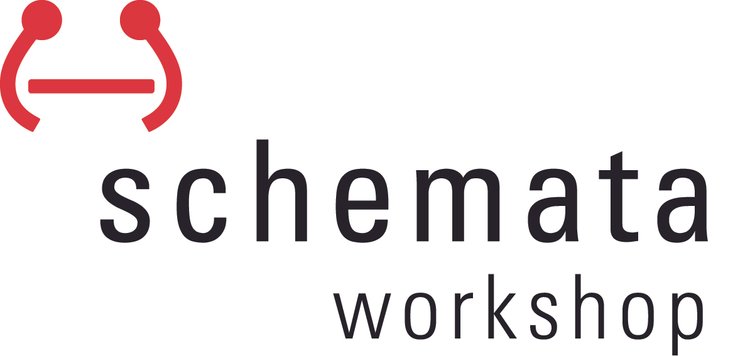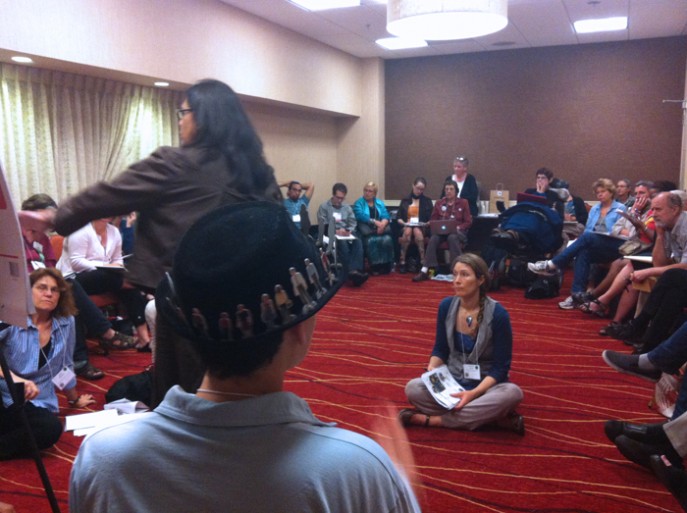Last week over 350 people convened in downtown Oakland to talk about living community. The National Cohousing Conference drew over interest from across the US and into British Columbia as well as 6 international countries (South Africa, Japan, Finland, New Zealand, Australia, and the United Kingdom).
As a long time attendee of the conference, I have worn many hats over the years (architect, presenter, board member, forming community member) which has informed the sessions I’ve attended. While I left the board in December, I found myself following my passions in bringing affordable housing to this movement and participating as a member of a forming group. Here are the highlights.
I started off the conference with my favorite preconference activity – a bus tour of 4 cohousing communities. While I have been on many a bus tour, this one stood out in the variety of the physical structures. The first community was Swan’s Market – an adaptive reuse of a historic market in downtown Oakland. This is a very urban mixed use site covering an entire city block – other uses within the historic building include retail at the street level, a children’s art museum, and a separate affordable housing community. The next was Pleasant Hill – a traditional cohousing community built from scratch. The third community was Temescal Creek – a retrofit community in Oakland. Two existing buildings were purchased and backyards connected to accommodate a community, over time adjacent homes were purchased and incorporated into the community. And the final stop was Berkeley Cohousing – a retrofit community formed around a farmhouse and few older structures with some new construction. This community was formed to address a need for affordable housing in Berkeley and is a limited equity condominium model.
Friday morning was the Roundtable on Affordable (Co)housing. This was a session that I helped coordinate with Katie McCamant and Betsy Morris to bring together affordable housing developers, bankers, and lawyers to discuss the perceived barriers to adopting principles of cohousing into their affordable housing projects. There was general support of the idea and key discussions about developing partnerships and using language that was familiar to the affordable housing funders.
Friday afternoon I gave a ½ day workshop on Designing the Cohousing Common House, sharing best practices and design principles.
That evening was a fabulous opening keynote address by John Robbins – son of ice cream mogul (Baskin & Robbins). He shared personal story about giving up his father’s legacy and fortune to live and more authentic life – his heartfelt stories were filled with love and its transformative power.
Saturday was the first official day of the conference. It started off with an address by Katie McCamant – conference chair, but also matriarch of American Cohousing – she and her husband Chuck Durrett are the architects who introduced the idea of cohousing to the United States in the late 1980’s.
The first session I attended was the one I was moderating on Partnerships with Community Land Trusts. It was a packed room of people from across the country who wanted to learn how CLTs might help bring affordable units to their forming communities. Presenters were Dev Goetschius (Founding Board member of the CLT Network and Executive Director of the Housing Land Trust of Sonoma County), Hank Obermayer (Board Member of Northern California Land Trust and founding member of Mariposa Grove Cohousing), and Crystal Fisher (Sales Manager for Community Home Trust that has 7 homes at Pacifica Cohousing).
In the afternoon, I attended another packed room session on affordable cohousing – a report from the task force that I helped to establish 2 years ago. While some progress has been made on the front of the Association, an exciting development was the formation of a new non-profit organization called Partnerships for Affordable Cohousing.
The day concluded with the Dinner and Live Auction – a major fundraiser for the Cohousing Association of the US, who puts on the national conference. It was a successful evening. And a Lifetime Achievement Award was presented to Katie and Chuck – so deserving!
Much later, after the after-party, about a dozen people convened in the hotel lobby bar to listen to a wonderful pianist amongst our ranks…in the usual cohousing fashion it turned into a memorable late night of songs, skits, dancing, spoken word and community. This impromptu gathering was probably the highlight of the conference.
Sunday was a fabulous session with Laird Schaub on delegating work to committees and developing clear mandates for them to enable proposals to quickly be adopted by communities in their plenary sessions. And I wasn’t able to attend, but heard that Janelle Orsi and Cynthia Hawley presented some great materials about legal aspects of cohousing. They provided free copies of a Legal Toolkit – which was exactly what my community needed at this moment.
Sadly, it was announced earlier in the day that there would be no conference next year and the next one will take place in 2014. While my report might sound like all work – there were many opportunities to catch up with friends from across the country and make new friends across the continents. I was also proud to have Kimberly Scaia from my community – Capitol Hill Urban Cohousing attending the conference with me. She represented us well and helped out as a volunteer to the Association. We had the chance to share meals and late night talks. All of these conversations and memories will fuel my community fire until the conference convenes again in 2014.








